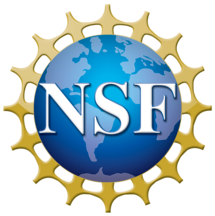ONGOING PROJECTS
Collaborative Research: Retention, Persistence, and Effectiveness of STEM Teachers in High-need School Districts-An Investigation of the NSF Robert Noyce Teacher Scholarship
National Science Foundation(Award No. #1950292), Division of Undergraduate Education, National Science Foundation, 2020-2024, $1,160,761
Core Research Team: Dr. Li Feng (PI and Project Director), Dr. Mike Hansen (PI at the Brookings Institution), Dr. David Kumar (PI at Florida Atlantic University)
Collaborators: Dr. Ann Cavallo and Dr. David Sparks (the University of Texas at Arlington), Dr. Hunter Close (Texas State University), Dr. John Pecore (the University of West Florida), Dr. Maria Fernandez (Florida International University)
This project involves three core research institutions (Texas State University, Florida Atlantic University, and The Brookings Institution) and four collaborating institutions with Noyce programs (Texas State University, the University of Texas at Arlington, University of West Florida, and Florida International University). The project will mine local and national databases for patterns that uncover the impact of Noyce projects on the supply of STEM teachers in the school districts they serve. The project seeks to raise awareness of challenges specific to STEM teachers in high-need settings, generate evidence-based policy solutions, and promote a better understanding of how Noyce projects influence the STEM teacher workforce. This Track 4: Noyce Research project is supported through the Robert Noyce Teacher Scholarship Program (Noyce). The Noyce program supports talented STEM undergraduate majors and professionals to become effective K-12 STEM teachers and experienced, exemplary K-12 STEM teachers to become STEM master teachers in high-need school districts. It also supports research on the persistence, retention, and effectiveness of K-12 STEM teachers in high-need school districts.

Faculty-Student Communities for Improving STEM Instruction
National Science Foundation(Award No. #1928696) Creating Faculty-Student Communities for Culturally Relevant Institutional Change, Division of Undergraduate Education, National Science Foundation, 2019-2024, $2,499,933
Dr. Li Feng (co-PI) with Dr. Heather Galloway (PI), Dr. Eleanor Close(co-PI), Dr. Alice Omstead (co-PI), and Dr. Cynthia Luxford (co-PI)
The Faculty-Student Communities Initiative is a comprehensive effort to support student-centered instructional change across the College of Science and Engineering at Texas State University. This five-year initiative is officially launching in 2020 and will consist of four programmatic components that provide STEM faculty and students with opportunities to engage in workshops, departmental self-assessments, redesign of lower-division gateway courses, and project-level decision making. Participating STEM departments will receive multifaceted intellectual, material, and logistical supports to empower faculty-student teams in developing sustainable communities focused on culturally relevant instruction. The initiative will also involve three research strands that focus on communities among faculty and students, STEM student trajectories at Texas State, and student graduation rates and STEM workforce outcomes for Texas State and other Hispanic Serving Institutions.
Find more info on our project site here.

 T-STEM Academies
T-STEM Academies
National Science Foundation(Award No. #1661097), Assessing the Impact of Texas Science, Technology, Engineering, and Mathematics Academies on Students’ Learning Environments, Educational Outcomes, and Career Path Decisions, Division of Graduate Education, 2017-2020, $589,407
Dr. Li Feng (co-PI) with Dr. David Knight (PI), Dr. David Carrejo (co-PI), and Dr. Stephen Kotok (co-PI)
This study examines the impact of Texas Science, Technology, Engineering, and Math (T-STEM) academies on (a) STEM teacher labor markets and (b) students’ educational and workforce outcomes. T-STEM academies are public high schools focused on improving instruction and academic performance in science and mathematics-related subjects and expanding the number of students entering STEM careers, particularly students who are underrepresented in STEM fields. Analyses draw on a statewide longitudinal student-level dataset covering all students in Texas over a 20-year period. This project is supported by the Education and Human Resources Core Research Program, which funds fundamental research in STEM learning and learning environments, broadening participation in STEM, and STEM workforce development.
COMPLETED PROJECTS
Big Data in Education
National Science Foundation(Award No. 1440637) Campus Cyberinfrastructure – Network Infrastructure and Engineering Program: Enabling and Improving Data-Driven Research at Texas State University, $499,896, 2014-2016.
Dr. Li Feng served as a Senior Personnel with a team of researchers on the project lead by Dr. Xiao Chen, Associate Professor with the Department of Computer Science.
Loan Forgiveness for Teachers
The Impact of Incentives to Recruit and Retain Teachers in “Hard-to-Staff” Subjects: An Analysis of the Florida Critical Teacher Shortage Program
Dr. Li Feng (Co-PI) and Dr. Tim R. Sass (PI); funded: $495,575
For long abstract on IES website, please click here.
Purpose: This project will evaluate the efficacy of programs created under the statewide Florida Critical Teacher Shortage Program (FCTSP) and a related set of teacher bonuses, the Teacher Recruitment and Retention Fund (TRRF). Components of the programs were in place starting in 1984 and ending in 2010 and provided a variety of incentives to become fully certified to teach in hard-to-staff disciplines like math, science and special education.
Project Activities: The research team will study in detail the effects of the incentives embedded in the FCTSP and related bonus program on the supply of teachers, the quality of teachers, and teacher retention. There are three elements to the program: loan forgiveness, tuition reimbursement, and (for a brief time) recruitment and retention bonuses. Researchers will provide a detailed description of participants and non-participants and evaluate whether the FCTSP has been effective at attracting and retaining teachers in targeted subjects. In addition to the program’s impact on the quantity of teachers, researchers will also investigate the effects of the program on teacher quality.
Products: Products include peer reviewed publications on the evidence of the effects of the incentives embedded in the FCTSP and related bonus program on the supply of teachers, the quality of teachers, and teacher retention.
Special Education Teacher Quality
The Effects of Teacher Preparation and Professional Development on Special Education Teacher Quality
Dr. Li Feng (Co-PI) and Dr. Tim R. Sass (PI); funded: $640,044
For long abstract on IES website, please click here.
